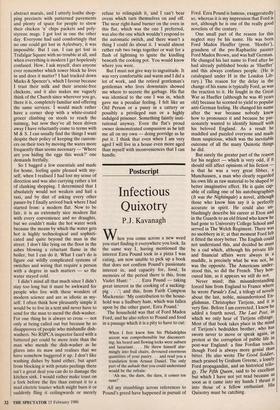Postscript
Infectious Quixotry
P.J. Kavanagh
When you come across a new word you start finding it everywhere you look. In the same way I, having mentioned the interest Ezra Pound took in a pizza I was eating, am now unable to pick up a book that does not confirm Pound's passionate interest in, and capacity for, food, In memoirs of the period there is this, from Violet Hunt: ' . . . Ezra Pound — taking great interest in the cooking of a sucking- pig . . .'; and this, from Faith Compton Mackenzie: 'My contribution to the house- hold was a Sudbury ham, which was fallen upon by the other guest, Ezra Pound.'
The household was that of Ford Madox Ford, and he also refers to Pound and food in a passage which it is a pity to have to cut: When I first knew him his Philadelphia accent was comprehensible but disconcert- ing; his beard and flowing locks were auburn and luxuriant. . . . He threw himself alar- mingly into frail chairs, devoured enormous quantities of your pastry. . . and read you a translation from Amaut Daniel. The only part of the aubade that you could understand would be the refrain:
`Ah me, the darn, the darn, it comes toe sune!'
All my stumblings across references to Pound's greed have happened in pursuit of Ford. Ezra Pound is famous, exaggeratedly so, whereas it is my impression that Ford is not, although he is one of the really good novelists of the century.
One small part of the reason for this neglect may be his name. He was born Ford Madox Heuffer (pron. 'Hoofer), grandson of the pre-Raphaelite painter Ford Madox Brown, and was half German. He changed his last name to Ford after he had already published books as 'Hueffer' and this always confuses people. (He is catalogued under H in the London Lib- rary.) The reason for the delay in the change of his name is typically Ford, as was the reaction to it. He fought in the Great War as Hueffer (although he was 40 years old) because he scorned to yield to popular anti-German feeling. He changed his name after the war because nobody knew how to pronounce it and because he pas- sionately wanted to identify himself with his beloved England. As a result he muddled and puzzled everyone and made them suspicious, which was the inevitable outcome of all the many Quixotic things he did.
But surely the greater part of the reason for his neglect — which is very odd, if it should still affect opinions of his fiction is that he was a very great fibber, a Munchausen, a man who clearly regarded his own life as raw material to be shaped to better imaginative effect. He is quite cap- able of calling one of his autobiographies (It was the Nightingale) a novel, although those who know him say it is perfectly accurate in spirit. He could also un- blushingly describe his career at Eton and in the Guards to an old friend who knew he had gone to University College School and served in The Welch Regiment. There was no snobbery in it; at that moment Ford felt it fitted the story better. The English could not understand this, and decided he must be a cad which, although his private life and financial affairs were always in a muddle, is precisely what he was not, he was the opposite. The Americans under- stood this, so did the French. They hon- oured him, as it appears we still do not. Never mind; this misunderstanding forced him from England to France where he wrote Parade's End, a trilogy of novels about the last, noble, misunderstood Ei!- glishman, Christopher Tietjens, and it Is very fine. Before I am corrected, I know he added a fourth novel, The Last Post, In which we only hear of Tietjens offstage. Most of that book takes place in the mind of Tietjens's bedridden brother, who has sworn never to move or speak again, ifl . protest at the corruption of public life In post-war England: a fine Fordian touch, though Ford is always more genial than bitter. He also wrote The Good Soldier, much praised by Graham Greene, a lonely Ford propagandist, and an historical tnlo- gy, The Fifth Queen, said to be excellent but which I have not yet read because as soon as it came into my hands I thrust it into those of a fellow enthusiast. His Quixotry must be catching.





































 Previous page
Previous page